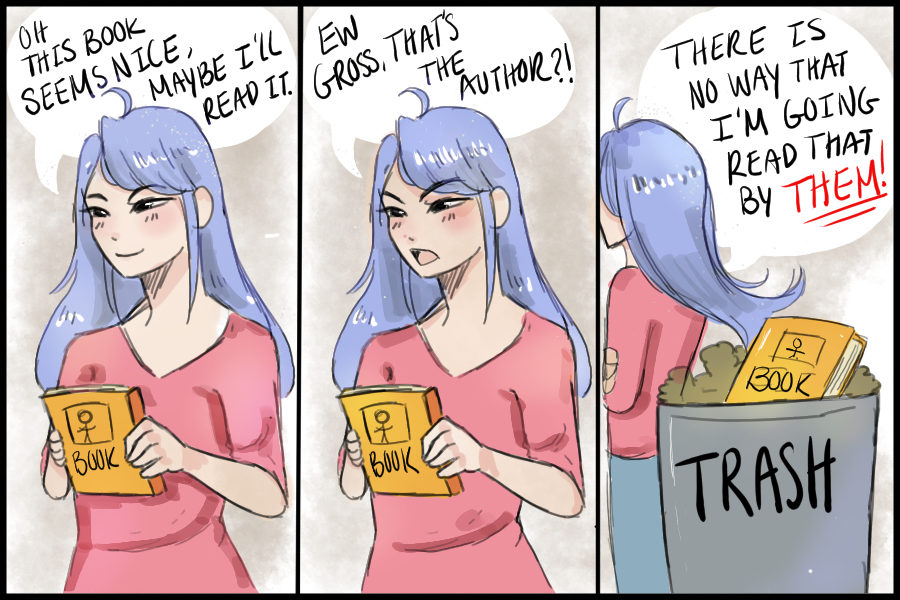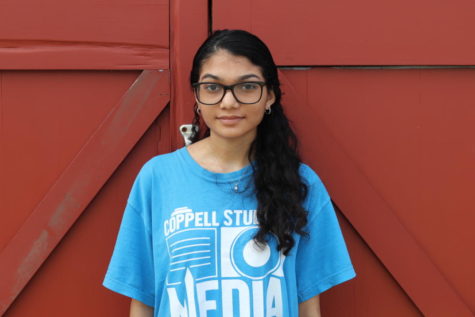Consuming art with an open mind
Separating artists’ personalities from their work
At many times, people do not support the work of a creator because of their personality or views. The Sidekick Copy editor Pramika Kadari shares her thoughts on seperating a piece of art from the artist themselves.
January 9, 2019
Since I read it five years ago, the science fiction classic Ender’s Game by Orson Scott Card has been my favorite book – despite the fact I detest Card himself, as he is homophobic, which conflicts with my personal values.
For years, there has been an ongoing debate of whether we should judge art based on its creator’s personality. A multitude of writers, painters, directors and others have committed questionable actions in their lives, and many times these actions are followed by hesitance to support the person’s creative work.
We all come to an artwork with our own biases, whether it’s politics, ethics, [or] race, and that’s why art is so great.
— CHS AP art teacher Michelle Hauske
Novels are not written to be a reflection of their writers, but rather a reflection of humanity as a whole. People should read them with open minds rather than automatically criticizing them based on who their creator is; the same principle applies to other art forms.
“There’s probably many artists who aren’t the nicest people, but their art is incredibly beautiful,” Coppell High School librarian Lynn Hevron said. “We can love what they created and not love who they are as a person.”
Even if an artist tries to weave their problematic beliefs into their work, you may still appreciate it. You do not need to interpret the piece how its creator intended you to.
“We all come to an artwork with our own biases, whether it’s politics, ethics, [or] race, and that’s why art is so great,” CHS AP art teacher Michelle Hauske said. “Because you should be able to bring your own interpretation to it. If the artist wants you to feel one way, you don’t have to feel that way, and that’s why art is so amazing.”
Furthermore, particularly regarding films, but also with books and other mediums, multiple people are involved in creating the final piece, which makes it impossible to blame only one person. From screenwriters to costume designers, dozens of innocent workers would be affected if people refused to endorse one problematic actor’s movies.
Of course, one exception to this is if the artist is actually using his/her art to commit immoral actions. For example, artist Damien Hirst is known for making pieces out of dead animals preserved in formaldehyde; because this contradicts my morals, I would not support his pieces.
“I find the ethics of art really interesting, it’s a discussion we have in my class all the time,” Hauske said. “It depends on your personal beliefs. If you’re against animal cruelty and there’s an artist who engages in that, you might not [support them].”
Taking the opposite perspective, people also should not automatically praise a piece simply because of who its creator is. In recent years, there has been an influx of autobiographical books by public figures, from actress Lily Collins to former first lady Michelle Obama. While these works certainly may be high quality, we should not be assuming they are.
Yes, my favorite author is homophobic and he disgusts me – but he also wrote the book that inspired me to be a writer, which is a passion that has stuck with me to this day. Art can open your world to a million different ideas, influence you in a million different ways; refusing to read books, watch films, or listen to songs simply because of the artist’s personality only limits your life experiences.
Follow Pramika on Twitter @pramika_kadari




















Raghavan • Feb 5, 2022 at 9:53 pm
Your inner most connected with consciousness for to conceive art forms with a open mind it geart way of alowing the self to recognize the consciousness reflection in front of you like how the netchur sowing its hone creativity. Art is sumthing new images that in front of you it is not mead before artist don’t know where it eggested in him ons it put on the surface it alowe to conceive his hone way they’re it is show more dimension then the artists conceive before so it is not the artist mead this only one art work but difrent spcteater meak many difrent in inner side of himself. Thanks to you meak me feel good righting. My prayers with you